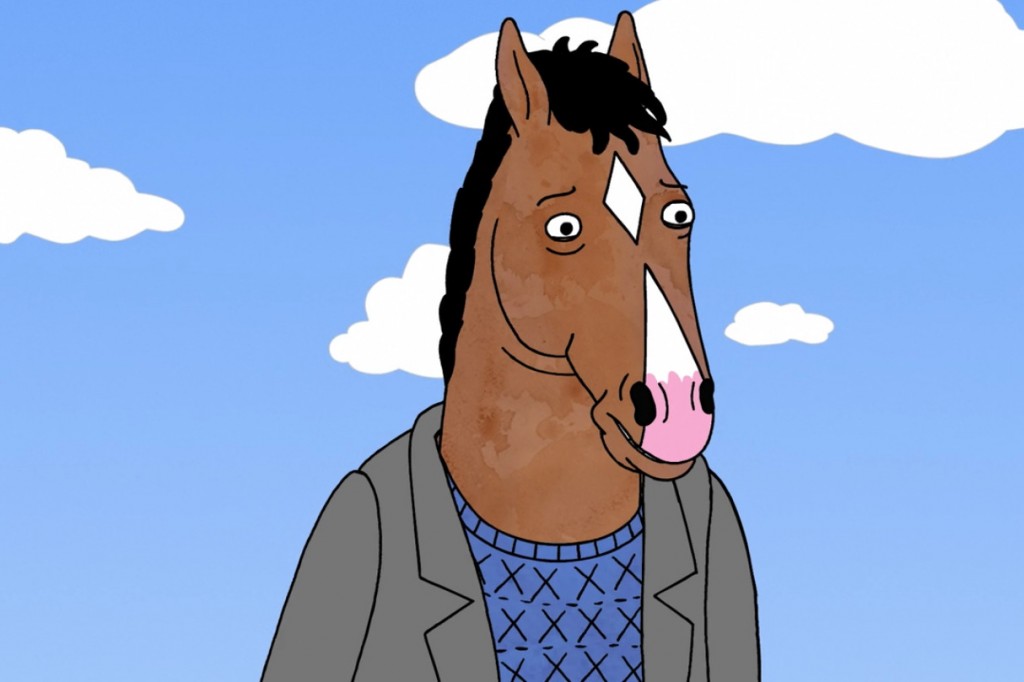
‘BoJack Horseman: Season four’ review
By Mercedes Deutscher, Social Media Coordinator
5/5
Caution: This review contains minor spoilers.
Netflix original BoJack Horseman released its fourth season on September 8, and as a massive fan of the show, I must say this is the strongest season yet.
Season four delves into the beautiful yet haunting family past of our protagonist. With less interaction between BoJack (Will Arnett) and the other main characters, other storylines are allowed to thrive. New supporting characters, voiced by a star-studded cast, range from hilarious to heartbreaking.
The season opener plays on a theme of political absurdity, one that no doubt resonates with an audience in 2017. Mr. Peanutbutter (Paul F. Tompkins), despite having no political experience whatsoever, has started a campaign to become the Governor of California, vying for the office held by Woodchuck (Andre Braugher). His wife, Diane Nyugen (Alison Brie), feigns support, despite sometimes opposite political stances and a rocky marriage.
In what may become a historic television storyline, Todd Chavez (Aaron Paul) struggles with asexuality.
Yet, by far the strongest theme of the season is parenthood. We see it reflected through Princess Carolyn (Amy Sedaris) as she debates staring a family with her boyfriend, Ralph (Raúl Esparza.) We see it through the eyes of Beatrice Horseman (Wendie Malick) who inherits her poor parenting through her own parents and broken dreams. We see it through Hollyhock (Aparna Nancherla,) a new character who yearns to know where she came from, even with a loving home life.
While the previous season experimented with storytelling with no dialogue, this season experiments with new styles of animation. Faces are scribbled out due to resentment or disappear along with memory. Edges and people become frantically drawn as BoJack spirals into his all-too-familiar depression. A cut-and-paste style is even used during a flashback of Princess Carolyn’s.
I have very few complaints over the new season, however one complaint is found in a certain tradition. It is tradition in BoJack Horseman that “fuck” is only spoken once. In past seasons, it is uttered in a serious and pivotal moment. Yet it slips out early in season four, and has been one that other fans have had to re-watch to notice. Of course, the significance of this f-bomb—quite different from its previous contexts—is revealed later on in the season. It’s forgettable, but I would say that it’s forgivable given the strength of the season as a whole.
Meanwhile, there are some episodes that seem like straight filler. I’m mainly referring to “Underground,” an episode where a campaign fundraiser goes horribly awry. While it has some comedic merits—and even then, it’s not the strongest for comedy—it stands out as an okay episode in an otherwise stellar season. Immediately following “Underground” is “The Judge.” While perhaps being slightly more relevant to the overarching story, this is my second pick for weakest episode. Although it touches on some strong themes of shallowness of celebrity culture and racism, it’s fairly forgettable, and its comedy feels forced. Having two weaker episodes right next to each other marks a dry spell in the season, but the following episodes more than make up for it.
It’s difficult to choose a favourite episode. One runner-up includes “Ruthie,” which follows an abnormally awful day for Princess Carolyn. A terrible day where seemingly everything goes wrong is a story that everyone can relate to—even though they may not experience the same hardships Princess Carolyn faces.
My other choice for runner-up is “Time’s Arrow.” It’s the 11th episode, which has always been the dark and emotional climax of the season. The episode is a flashback episode that focuses on the previously mysterious upbringing of Beatrice Horseman, BoJack’s mother. It demonstrates hard decisions, and how we must live with the choices we make.
But if I could only choose one episode as my favourite, it would be “The Old Sugarman Place.” It follows up on BoJack’s state after he seemingly runs away from all of his troubles in Hollywoo at the end of season three. It also focuses on a pivotal time in Beatrice’s young life. Despite probably 50 years taking place between these storylines, they parallel each other perfectly, sometimes even in the same screen. It tackles mental health and gender—once in a time where women were encouraged to keep their emotions to themselves, followed with how men are expected to show their emotions today. The music is dazzling, and leaves me humming along days after. It is not only one of the best episodes in BoJack Horseman as a whole, but perhaps one of the best episodes on television this year.
I could probably fill this entire publication with praise over this show, but for brevity’s sake—just watch it. BoJack Horseman is so much more than another adult cartoon. It will make you smile, it will make you cry, and it will make you hurt. But you will love it all the more.

